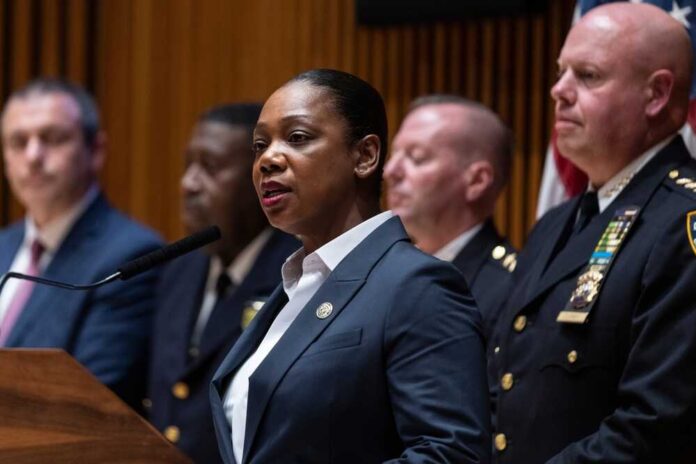
In an unexpected turn of events, New York Police Department (NYPD) Commissioner Keechant Sewell resigned abruptly on Monday, marking a substantial change for the city’s law enforcement leadership. Sewell, the first woman to ever hold the role, had been on the job for only a year and a half, appointed by Mayor Eric Adams (D) last year.
Sewell’s departure resonates beyond the walls of the NYPD. The city has seen several high-ranking officials leave their posts in recent weeks, with Sewell’s exit amplifying concerns about the stability of leadership under Mayor Adams’ administration.
NYC Police Commissioner Keechant Sewell Resigns After 18 Months On The Job https://t.co/I2DNAHvyVN #OAN pic.twitter.com/t8WStVdYJY
— One America News (@OANN) June 13, 2023
In her departure email, Sewell voiced her steadfast support for the NYPD and New York City, despite stepping away from her post. She praised the bravery and dedication of her officers, remarking on the “compassion, heroics, and selflessness” she observed daily during her tenure.
The Commissioner was credited with significant reductions in major crimes during her time in office, with data showing a 13% drop in murders and a 17% decrease in shootings. However, her leadership was also marred by allegations of inefficient external control and micromanagement.
One contentious point was the perception of limited autonomy in her role. Normally, the Commissioner has broad authority over staffing decisions, including promotions. However, Sewell reportedly faced obstacles from City Hall, particularly in promoting officers to higher-ranked positions. It was speculated that this lack of independence was partly in response to her disciplining the Chief of the Department, Jeffrey Maddrey.
Additionally, Sewell had to deal with the overshadowing presence of Phillip Banks, the Deputy Mayor of Public Safety. Banks, a key supporter of Mayor Adams, frequently held public crime briefings without Sewell, feeding allegations that she wasn’t entirely in control of the NYPD.
Sewell’s predecessor, Dermot Shea, served for approximately two years, while James O’Neill before him held the position for three. The constant turnover in one of the most stressful positions in law enforcement illustrates the difficulty of the role, especially amid rising crime rates and the continuous scrutiny of law enforcement practices.
A notable factor in this scenario is Adams’ promise during his election campaign to appoint a woman to the position. While a praiseworthy gesture, it leads to asking whether political considerations overrode the need for a well-experienced individual to take the reins in such challenging times.
Moving forward, the NYPD faces an uphill task of restoring stability, improving law enforcement practices, and above all, rebuilding trust with the communities it serves. Given Sewell’s commendable performance during her brief stint, the department could benefit from a leader with her dedication and spirit.



























